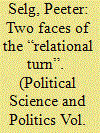| Srl | Item |
| 1 |
ID:
176027


|
|
|
|
|
| Summary/Abstract |
The endeavour to explain and predict international affairs is getting harder since it is ever more widely accepted that heterogeneous and fluid actors are making international politics. Positivists of various types have dominated the discussion on knowledge creation in the discipline of International Relations (IR), but the increasing acceptance of the dynamic character of international politics has led to the support and use of constructivist, post-Western or feminist approaches. There has also been an uptick in methodological discussions on these critical, non-positivist approaches. This article contributes to these debates by offering the first steps towards a cognitive frames–based methodology for IR. With a pragmatist ontology as its foundation, the approach re-sets the focus of analysis to the rationality of the international actors. The article, offers an initial description, by relying on illustrative examples, of the creation, the reach, durability and the organisational structure of cognitive frames in the global arena.
|
|
|
|
|
|
|
|
|
|
|
|
|
|
|
|
| 2 |
ID:
145072


|
|
|
|
|
| Summary/Abstract |
In the previous decade, the literature on “relational approach” has burgeoned in the social sciences. Recently, a “relational turn” in political science was called for in a symposium in this journal (McClurg and Young, 2011). The participants perceived a promising path for such a “turn” by introducing social network analysis (SNA) into political science. This call is informed by a conviction that the central concept of political science— that is, power—is relational. Considering this viewpoint, this article argues that there are two different understandings of the connection between the qualifier “relational” and the concept of power, referred to as the “Anglo-American” and the “Continental” perspectives. I contend that symposium participants conceived of the connection from only the Anglo-American perspective and that the Continental understanding would add extra value for political science.
|
|
|
|
|
|
|
|
|
|
|
|
|
|
|
|